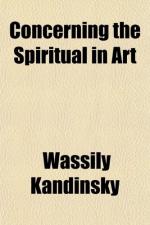In politics they are generally republican, with a knowledge of different parliamentary procedures; they read the political leading articles in the newspapers. In economics they are socialists of various grades, and can support their “principles” with numerous quotations, passing from Schweitzer’s Emma via Lasalle’s iron law of Wages, to Marx’s capital, and still further.
In these loftier segments other categories of ideas, absent in these just described, begin gradually to appear—science and art, to which last belong also literature and music.
In science these men are positivists, only recognizing those things that can be weighed and measured. Anything beyond that they consider as rather discreditable nonsense, that same nonsense about which they held yesterday the theories that today are proven.
In art they are naturalists, which means that they recognize and value the personality, individuality and temperament of the artist up to a certain definite point. This point has been fixed by others, and in it they believe unflinchingly.
But despite their patent and well-ordered security, despite their infallible principles, there lurks in these higher segments a hidden fear, a nervous trembling, a sense of insecurity. And this is due to their upbringing. They know that the sages, statesmen and artists whom today they revere, were yesterday spurned as swindlers and charlatans. And the higher the segment in the triangle, the better defined is this fear, this modern sense of insecurity. Here and there are people with eyes which can see, minds which can correlate. They say to themselves: “If the science of the day before yesterday is rejected by the people of yesterday, and that of yesterday by us of today, is it not possible that what we call science now will be rejected by the men of tomorrow?” And the bravest of them answer, “It is possible.”
Then people appear who can distinguish those problems that the science of today has not yet explained. And they ask themselves: “Will science, if it continues on the road it has followed for so long, ever attain to the solution of these problems? And if it does so attain, will men be able to rely on its solution?” In these segments are also professional men of learning who can remember the time when facts now recognized by the Academies as firmly established, were scorned by those same Academies. There are also philosophers of aesthetic who write profound books about an art which was yesterday condemned as nonsense. In writing these books they remove the barriers over which art has most recently stepped and set up new ones which are to remain for ever in the places they have chosen. They do not notice that they are busy erecting barriers, not in front of art, but behind it. And if they do notice this, on the morrow they merely write fresh books and hastily set their barriers a little further on.




